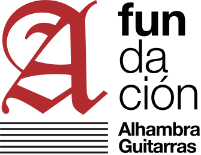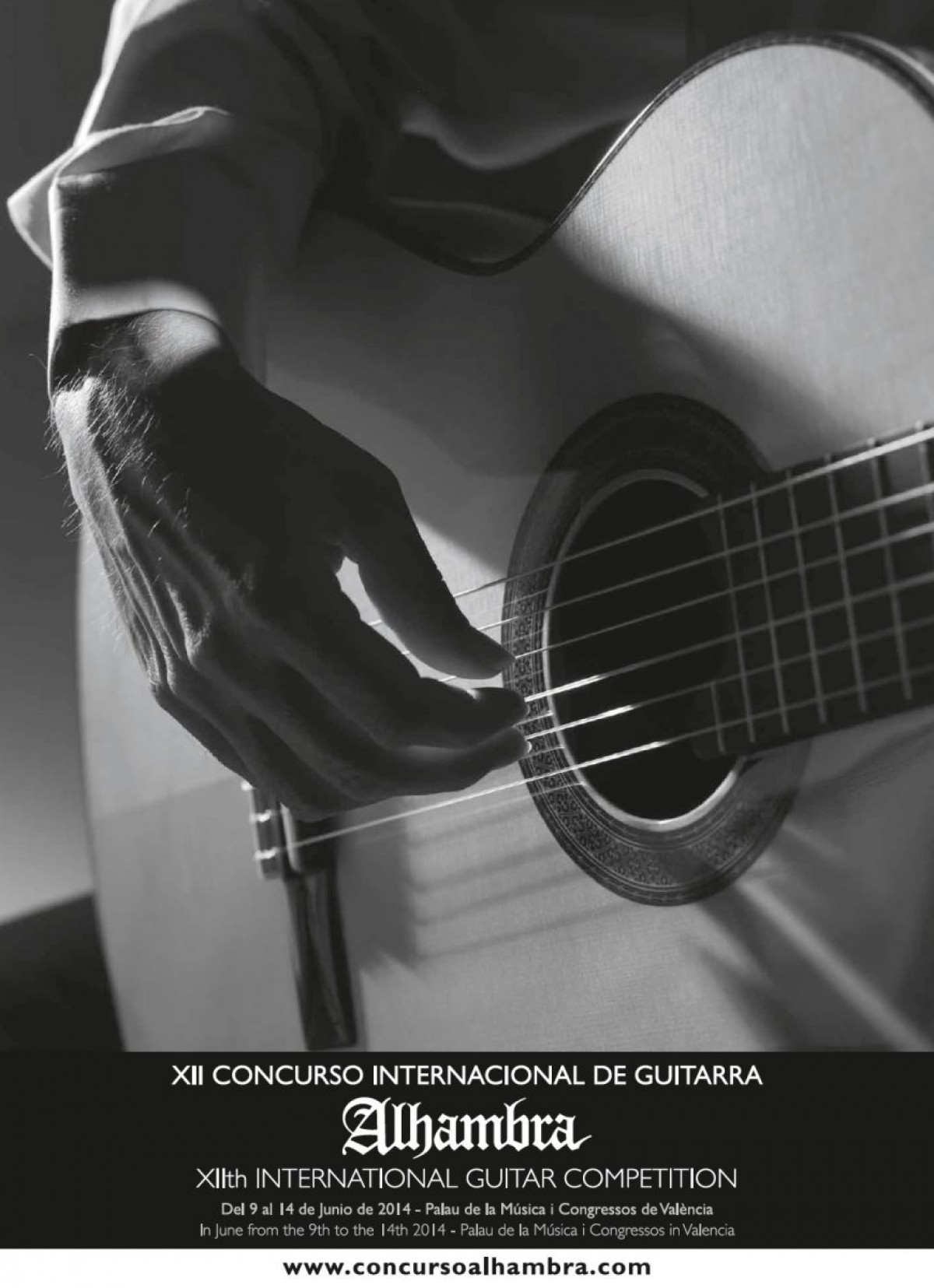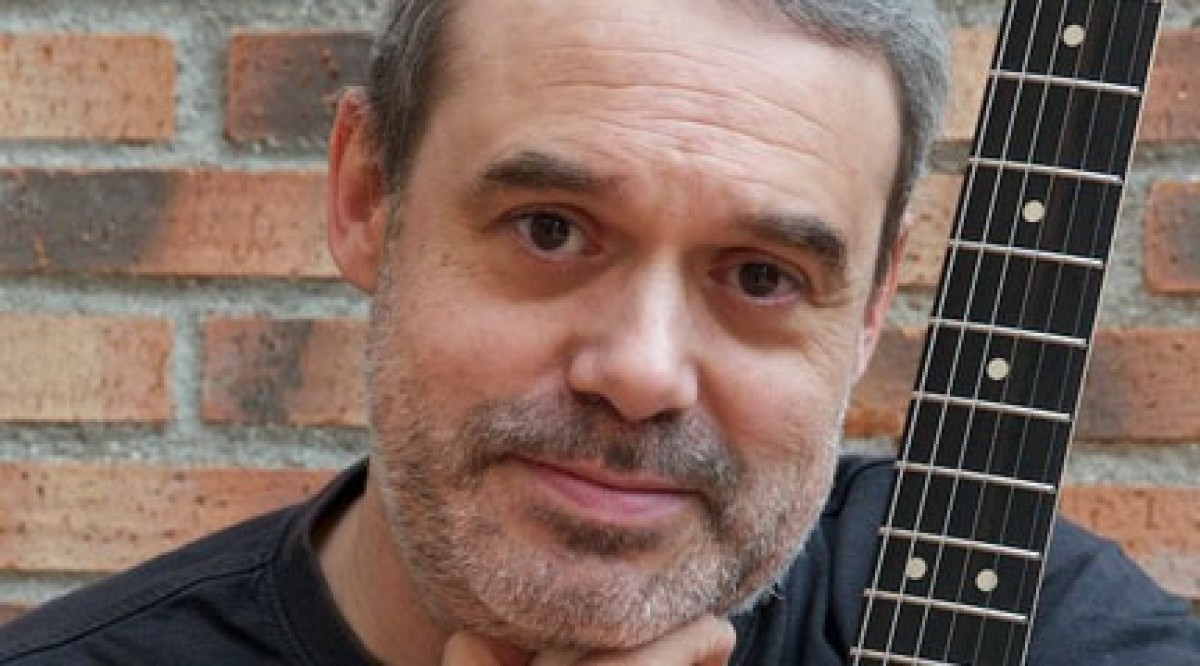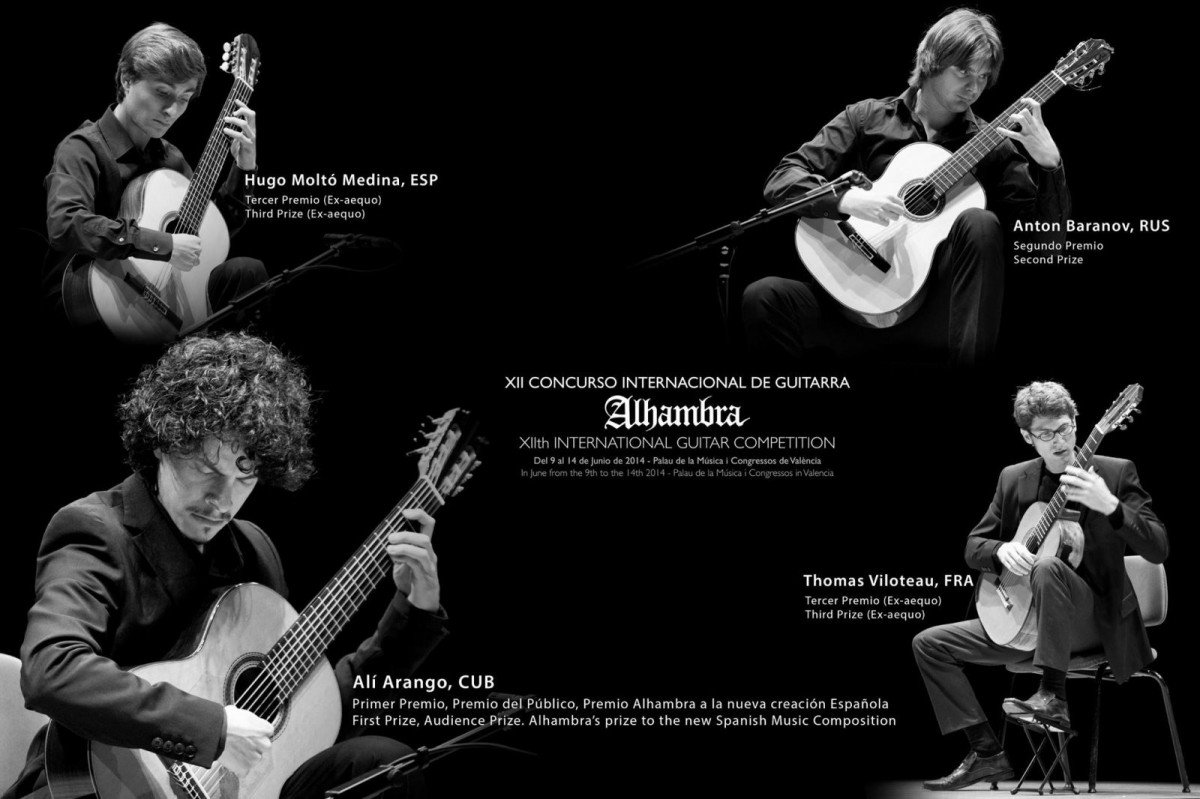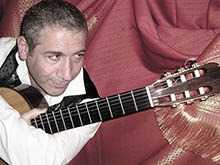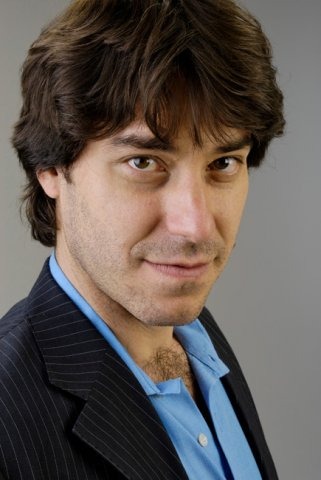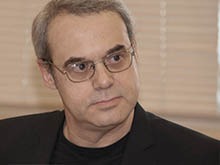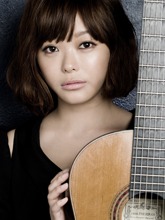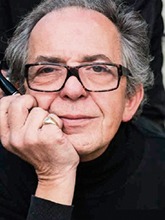
-¿Cómo recibió la propuesta de componer una obra para el Concurso Internacional de Guitarra Alhambra?
Recuerdo que fue una llamada del propio José Luis Ruiz del Puerto, que me pilló minutos antes de salir para el estreno de mi obra “Caro Domenico” en el Instituto Italiano de Cultura de Madrid… Es decir, ¡recibí la propuesta con la guitarra en la mano!
-¿Hasta qué punto ha condicionado la creación de la obra el hecho de ser un encargo para un Concurso?
Por propia voluntad he querido que el condicionamiento fuera intenso en un sentido muy particular: he procurado que se tratara de una obra muy idiomática, abiertamente nacida de la guitarra, pero a la vez alejada de un virtuosismo que pudiera resultar agobiante para el concursante en el trance que supone participar en un concurso internacional de esta altura. Mi idea era, finalmente, que el concursante pudiera mostrar más su musicalidad que un grado de virtuosismo que seguramente estará presente en otras obras que podamos escuchar en la competición.
-Fantasia y Rondó es el título de la obra que ha compuesto. ¿En qué se ha inspirado para componer esta pieza?
Realmente, el punto de inspiración ha sido la propia guitarra, que es para mí un verdadero “gabinete de composición”.
-¿Qué puede contarnos de ella?
Se trata, como el título indica, de un díptico. La Fantasía es una pieza en forma ternaria, muy sencilla, con una primera parte basada en una contraposición libre de elementos, seguida de una sección central rápida y fluida, en arpegios que ascienden hasta conquistar el registro sobreagudo, para llegar a una recapitulación condensada de la primera parte, que se pierde en una coda rallentando, evanescente, que alterna armónicos y notas reales. El Rondó es, por el contrario, un movimiento eminentemente rítmico, con un estribillo enérgico y sencillo. El último episodio es un canon, que interrumpe la textura predominante en la pieza antes de la última aparición del estribillo.
-¿Qué cree que aporta al repertorio para guitarra?
Puff! Sería muy presuntuoso por mi parte intentar definir este punto. Eso lo decidirán los intérpretes y el tiempo...
-Dentro de su actividad profesional como músico destaca también la de ser un buen guitarrista. A la hora de componer esta obra para guitarra u otras que ya tiene en su catálogo ¿Cree que le ayuda el hecho de conocer muy bien el instrumento o por el contrario cree que se sentiría más libre si no fuera así?
Pienso que en todos los instrumentos, pero muy especialmente en el caso concreto de la guitarra, el conocimiento del medio es una enorme ayuda para adecuar correctamente las ideas musicales al resultado sonoro. La mecánica del teclado es bien conocida por todos los compositores; la de los vientos o incluso la de los arcos (al menos en su tratamiento orquestal) es muy “asumible” a la hora de componer. La guitarra presenta, sin embargo, unas particularidades técnicas que hacen que pasajes de concepción sencilla sean imposibles de ejecutar mientras que, al contrario, otros aparentemente tremendos resulten fáciles y eficaces para sacar un gran partido al instrumento. No digo con esto que piense que hay que ser intérprete del instrumento para escribir para él, ni mucho menos: al hablar de que el compositor debe “conocer” no me refiero a “tocar”, sino a poder imaginar con cierta precisión la técnica de un instrumento. Pero desde luego, en mi caso concreto, el hecho de ser intérprete me da - no me quita – libertad, en buena medida porque la improvisación juega un papel importante en mi manera de abordar la composición: trabajo mucho con apuntes que provienen de improvisaciones nacidas en la guitarra.
-¿Cómo ve el panorama actual de la composición para guitarra entre las nuevas generaciones de compositores?
Creo que la guitarra, por fin, se está normalizando entre los jóvenes compositores, gracias en gran medida a la labor de varias generaciones de intérpretes especialmente interesados en ampliar el repertorio del instrumento. Hoy día es frecuente que el catálogo de los nuevos compositores contenga tanto obras para guitarra sola como, quizá más importante aún, música de cámara con guitarra. El panorama es, desde mi punto de vista, excelente, pero los intérpretes no deben de cejar en su empeño de vivir en el presente y demandar música nueva.
-¿Cree que siguen siendo necesarios los Concursos para abrirse camino en el mundo profesional de la música?
Indudablemente. Puedo decir que, como profesor de análisis y armonía para intérpretes, conozco de cerca el tema, y veo día a día que los concursos siguen siendo una herramienta imprescindible, tanto para abrirse camino como para tener una visión más objetiva del trabajo de uno frente (o al lado de) los demás en el instrumento. El concurso es además un estímulo de primer orden para el estudio, una manera de conocer repertorio y, a fin de cuentas, una forma de llegar al mundo con el propio instrumento como arma y modo de expresión.
-¿Qué consejos les daría a aquellos guitarristas que estén preparando su obra para presentarse al Concurso?
Que trabajen analíticamente la partitura antes de empezar a estudiar (no hay una sola forma de hacer esto: cada cual se aproximará a la obra según su sensibilidad, conocimientos y necesidades), y una vez conocidos sus aspectos principales – forma, armonías y modos característicos, ritmo, texturas –, se dediquen a expresar con total libertad, es decir, a hacer música…
XIIth ALHAMBRA INTERNATIONAL GUITAR COMPETITION
From 9th to 14th June 2014
Palau de la Música in Valencia
COMPETITITORS
- Augusto Pedro Enrique Ruiz, Cuba
- Andrés Campanario Rodríguez, España-Spain
- Ana Lourdes Uriarte Arévalo, España-Spain
- Alfonso Rubio Rodríguez, España-Spain
- Khaled Hassan Mohamed Moustafa, Egipto-Egypt
- Elsayed Shokry Eshrin, Egipto-Egypt
- Borbála Seres, Hungría-Hungary
- Filipe Miguel de Amorim da Silva Vieira, Portugal
- Fernando Antonio Troche Vinent, Uruguay
- Sanel Redzic, Bosnia
- Tal Hurwitz, Israel
- Thomas Viloteau, Francia-France
- Anton Baranov, Rusia-Russia
- Pavel Kukhta, Bielorusia-Belarus
- Mario Kurtjak, Eslovenia-Slovenia
- Eduard Leata, Rumanía- Romania
- Cristian Gramesc, Rumanía-Romania
- Argenis, Venezuela
- Taiki Matsumoto, Japón-Japan
- Emerson Salazar Sepúlveda, Chile
- Mircea-Stefan Gorgoncea, Rumania-Romania
- Hugo Moltó Medina, España-Spain
- Elise Neumann, Alemania-Germany
- Andrea González Caballero, España-Spain
- Juniors César Zambrana Sarracent, Cuba
- Alí Arango, Cuba
- Florian Larousse, Francia-France
- Florian Palier, Austria
- Koen Claeys, Bélgica-Belgium
- Takuya Okamoto, Japón-Japan
- Jérémy Peret, Francia-France
- José Alejandro Córdova Hernández, Méjico-Mexico
- Harold Gretton, Australia
- Pavlo Stepanovych, Ucrania-Ukraine
- Marko Topchii, Ucrania-Ukraine
- Roman Zorkin, Rusia-Russia
- Alejandro Acosta Rodríguez, Cuba
- Toshiyuki Kumagai, Japón-Japan
Laurent Boutros was born in 1964 in Maisons-Alfort , near Paris. While still young he attracted to music from oral traditions, and became interested in Flamenco, then popular Brazilian and Argentinian music, final folowing the music through to his origins.
Then in 1997 he began to travel through Europe, making several tours in Turkey, Armenia, Maroc, Hungary, Montenegro, Switzerland and Cuba. As a guitarist he enjoys playing with others, and has performed with the jazz bass- player Renaud Garcia Fons, the Iranian Percussionist Bijane Chemirani and the Indian musician Ikram Khan.
In 2003, Laurent Boutros formed in own trio, with F. Ziouani on the cello and F. Thiant on the accordeon.
In 2004, upon request by the Pompidou Center Museum, he composed a pièce for guitar about Joan MIRO painting « Carnaval d’Arlequin ». Last but not least he is the director of the festival « Nuits musicales de Cieux », in the Limousin departement, which is centred around the guitar. Here several different styles rub shoulders, including world music, jazz and classical.
In 2007, his last CD is available « A guitar in Armenia » around his own compositions. This Year Laurent Boutros make several tours in Cuba ( invited by « The Instituto Superior del Arte » and Venezuela ( Festival internacional de guitarra de Choroni).
Laurent Boutros was born in 1964 in Maisons-Alfort , near Paris. While still young he attracted to music from oral traditions, and became interested in Flamenco, then popular Brazilian and Argentinian music, final folowing the music through to his origins.
Then in 1997 he began to travel through Europe, making several tours in Turkey, Armenia, Maroc, Hungary, Montenegro, Switzerland and Cuba. As a guitarist he enjoys playing with others, and has performed with the jazz bass- player Renaud Garcia Fons, the Iranian Percussionist Bijane Chemirani and the Indian musician Ikram Khan.
In 2003, Laurent Boutros formed in own trio, with F. Ziouani on the cello and F. Thiant on the accordeon.
In 2004, upon request by the Pompidou Center Museum, he composed a pièce for guitar about Joan MIRO painting « Carnaval d’Arlequin ». Last, but not least he is the director of the festival « Nuits musicales de Cieux », in the Limousin departement, which is centred around the guitar. Here several different styles rub shoulders, including world music, jazz and classical.
In 2007, his last CD is available « A guitar in Armenia » around his own compositions. This Year Laurent Boutros make several tours in Cuba ( invited by « The Instituto Superior del Arte » and Venezuela (Festival internacional de guitarra de Choroni).
The Cuban guitarist Joaquín Clerch was born in Havana. He studied guitar, music and composition in Havana, graduating from the Art University of Havana in 1989.
In 1990, Joaquín Clerch continued his studies at the Mozarteum University in Salzburg, Austria. Here he studied guitar with Eliot Fisk and Early Music with Anthony Spiri and Nikolaus Harnoncourt He graduated with distinction in Salzburg in 1991 and was awarded the prize for extraordinary artistic achievement by the Austrian ministry of science and research.
Joaquín Clerch has won many important guitar competitions, such as the Andres Segovia competition in Granada, the Heitor Villa-Lobos competition in Rio de Janeiro, Printemps de la Guitare in Brussels and the ARD competition in Munich.
He has played in many cities and prestigious concert halls the world over, e.g. Concertgebouw (Amsterdam), Palacio de la Música (Barcelona), Théâtre Royal de la Monnaie (Brussels), Alte Oper (Frankfurt), Auditorio Manuel de Falla (Granada), Teatro Nacional (Havana), Cemal Resit Rey (Istanbul), Kölner Philharmonie (Cologne), Brucknerhaus (Linz), Auditorio Nacional de Música (Madrid), Münchener Philharmonie (Munich), Radio France (Paris), Beijing Concert Hall (Beijing) and Konzerthaus (Vienna).
Since 1999, Joaquín Clerch has held a professorship of guitar at the Robert Schumann University in Düsseldorf.
Born in 1964 in Madrid, musically trained in the guitar, disciple of Francisco Guerrero and Luis de Pablo in his native city, David del Puerto emerged very early as one of the most talented composers of his generation. At just 20 his name was on the bill at the Almeida Festival in London and shortly afterwards he was commissioned by Pierre Boulez to write a new work for the Ensemble InterContemporain. Since then, his music has been present at the most important concerts, festivals and seasons in Europe, Japan, Indonesia, Australia, USA, Canada and Latin America, where it has been performed by ensembles such as the London Symphony, Finnish Radio Symphony Orchestra, Nieuw Ensemble, Wisconsin University Symphony Orchestra, etc...
He has also been intensely active in teaching as guest professor at Universities, Conservatories and courses in Europe and the USA. He is currently professor of Analysis at the Escuela Reina Sofía in Madrid. David del Puerto’s musical career has been marked by a calm but steadfast search for himself, with no reservations or concessions, which has led him along one of the most original and personal paths in the world of music today.
Kyuhee Park was born in Incheon city, South Korea, in 1985. She started studying guitar when she was 3 years old. She won the 1st prize in “youth” of the National Korean Guitar Competition at 9 years old. In 2004, she started to study in the Tokyo College of Music. She participated in an opera-tour which was conducted by Maestro Seiji Ozawa. She was taught by Shin-ichi Fukuda and Kiyoshi Shomura who are Japanese leading classical guitarists. Nowadays, she is studying in Vienna Music University with Alvaro Pierri.
Kyuhee Park has got many prizes in various competitions as below:
-
2005 Korean guitar music competition 1st prize.
-
2007 Heinsberg international guitar competition 1st prize and audience prize
-
2008 Printemps de la Guitare international competition 1st prize (She is the 1st prize winner as female and also as Asian in this competition history), Koblenz international guitar competition 2nd prize
-
2010 Agustin Barrios International Guitar Competition 1st prize.
-
2012 Alhambra International Guitar Competition 1st prize and audience prize.
Kyuhee Park took part in the “Guitar Festa” in Hakuju Hall, Tokyo, 2009. Her performance was highly acclaimed and she gathered broad attention. She made her CD debut with “Sueño” from FONTEC in Japan in 2010 and released “Sonata Noir” in 2012. Both CDs have highly acclaimed and more over the sales are extraordinary among the classical guitar world.
Wolfgang Weigel (Germany). Began studying in the Higher Schools of Music in Saarbrücken and Lübeck when he was 16. In 1974, he completed his studies and was qualified as an artist and teacher of music. He studied with the eminent teacher. Karl Scheit in Vienna. His concert tours as a soloist, with orchestra and chamber music groups, have taken him through every country in Europe, U.S., Latin America and Canada, performing at important international festivals. Weigel is a very skilled guitarist in the interpretation of contemporary music for guitar. He has released a multitude of woks from international composers, and feels a special predilection for Spanish music of our time.
XII ALHAMBRA INTERNACIONAL GUITAR COMPETITION
From 09th to 14th June 2014
Palau de la Música in Valencia
ACTIVITIES
MONDAY 09th
HALL LUCRECIA BORI
18:00
Opening Ceremony.
Presentation of the Competition.
Public drawing to determine the order of the Competitors.
HALL RODRIGO
19:30
Concert by Kyuhee Park.
Opened to the public. Limited capacity.
TUESDAY 10th
HALL MARTIN Y SOLER
10:00 - 13:3o
17:00 - 21:3o
First round starts.
Not open to the public.
WEDNESDAY 11th
HALL MARTIN Y SOLER
10:00 - 13:3o
17:00 - 19:3o
First round continues.
Not open to the public.
HALL LUCRECIA BORI
19:30
Concert by young guitarists.
Opened to the public. Limited capacity.
Reading of the minutes of the Jury.
THURSDAY 12th
HALL RODRIGO
17:00 - 20:00
Second round starts.
Opened to the public. Limited capacity.
FRIDAY 13th
HALL RODRIGO
17:00 - 20:00
Second round continues.
Opened to the public. Limited capacity.
HALL LUCRECIA BORI
20:00
Concert by Graham Devine.
Opened to the public. Limited capacity.
Reading of the minutes of the Jury.
SATURDAY 14th
HALL LUCRECIA BORI
11:30
Round table debates with the members of the Jury.
Opened to the public. Limited capacity.
HALL RODRIGO
18:00
Final of the Competition.
Presentation of finalists.
Reading of the minutes of the Jury.
Awards Ceremony.
EXHIBITION OF GUITARS
HALL LUCRECIA BORI
12th, 13th & 14th June.
10:30 - 13:30 / 17:00 - 21:30
